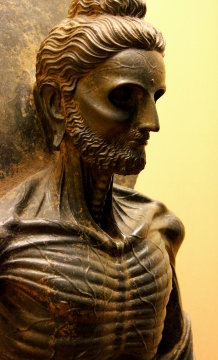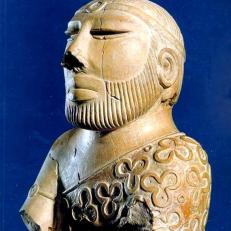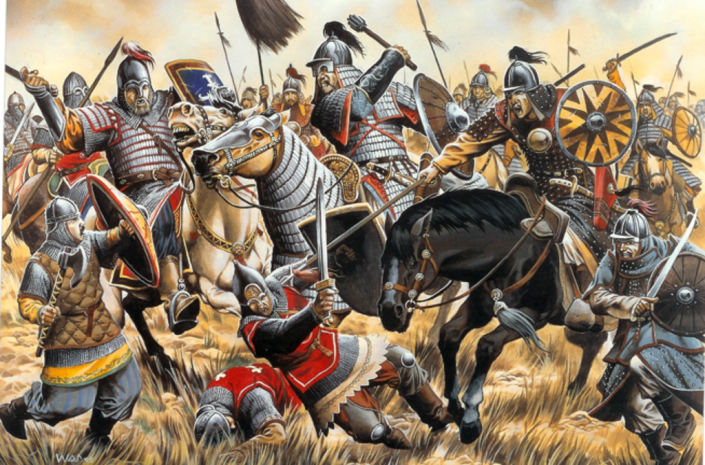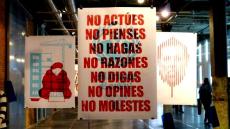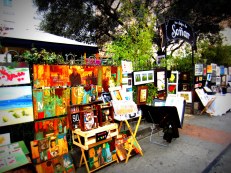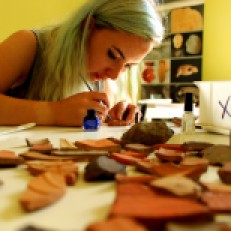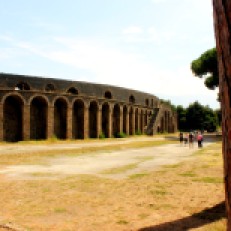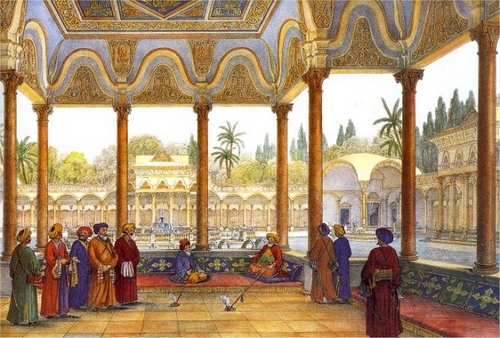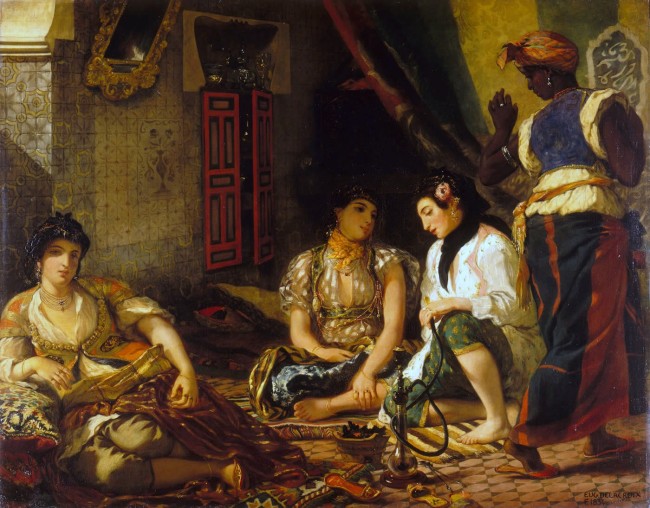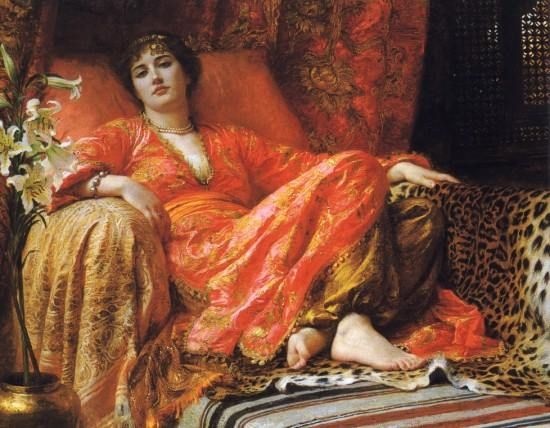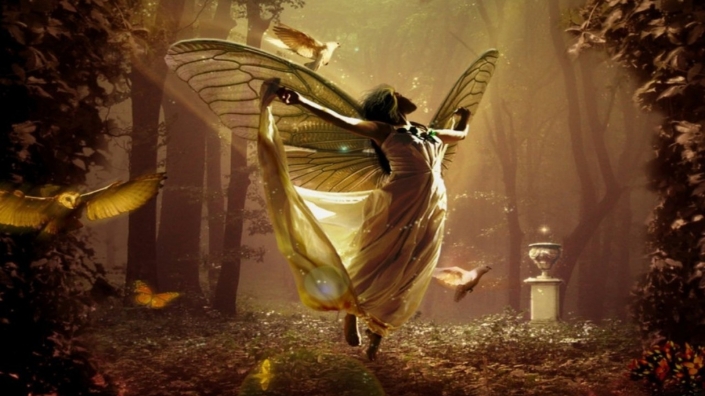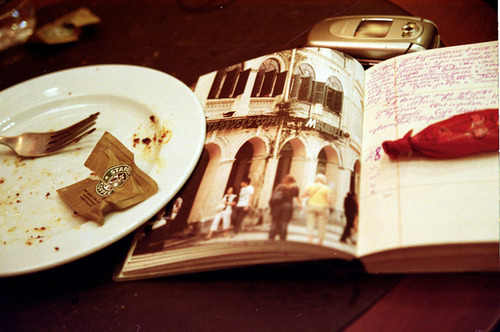Pakistan
On heritage
“The ground on which we stand is sacred ground. It is the dust and blood of our ancestors.” – Chief Plenty Coups, Crow
Whenever I visit a new city, the first thing I like to do is pay my respects to her oldest monument.
Like the towering 12th century St. Stephen’s Cathedral in Vienna. The ancient, sprawling Palatine Hill in Rome. A ruined Moorish lookout tower in the village of Zahara de la Sierra in Andalusia. The 1000-year old dragon tree on the island of Tenerife.
Or, when I’m back in my hometown Lahore, the 10th century shrine of Ali Hajveri, the city’s patron saint and one of South Asia’s most celebrated sufis.
It’s kind of like how you make it a point to greet elders first at a family gathering, or how you always pop in to say salaam to Aunty Uncle or Daadi Daada when calling at a friend’s.
Why is it considered proper to do this?
Because age, when tempered by experience and good sense, is wisdom. And wisdom commands respect.
Our parents, grandparents and great-grandparents are the pillars of our community, our connection with the past. And much of who we are – our tastes, our temperament, the intonation of our voice, that dimple on the chin – we owe directly to them.
So it is with cultural heritage.
It’s an intangible thing, our relationship with heritage; a deep, spiritual connection that can’t be quantified, only experienced.
Like the feeling of awe you get when entering a breathtaking mosque or cathedral, in all its glazed tiled, stained glass, soaring glory. The wonder of walking through a mind-blowingly modern city like 1st century Pompeii. The peace of contemplating the Fasting Buddha at the Lahore Museum.
Or the tingling horror of seeing before you the torture instruments used during the Spanish Inquisition.
Heritage speaks to us. It moves us, because it’s an intrinsic part of ourselves. It tells us who we are, where we come from and what we’ve done – for better or for worse. Heritage gives us identity.
So when human beings destroy cultural heritage – whether purposefully, as invaders and extremists have done throughout the ages, or out of sheer stupidity and greed, as often happens in Pakistan – they aren’t just blowing up bricks and stones, or splashing white paint on a delicately frescoed tomb.
They’re erasing the identity of a society. By blotting out pieces of the past, they leave us a fragmented, rootless future. They leave us without a story.
Years and years ago, there used to exist a temple here. A sculpture. A library. A place of beauty, intelligence and culture.
But you will never know it. You will never wander its ruined pathways, finger its mossy stones, or feel that inexplicable sense of belonging, the warm pride of knowing, “My ancestors built this. And I am a part of this mysterious, timeless story.”
What will you build on now? Where will you find inspiration? How will you write the next chapter of the story?
I often feel a strong sense of déjà vu when visiting old places. There is power there, the coming together of a thousand wills, of history being constructed, brick by brick and thought by thought. Being in these places, you begin to see things differently; you begin to understand why people look the way they do, why they speak in a certain way, why they create certain things – why they are who they are, for better and for worse.
It’s like seeing old photographs of your grandparents and great-grandparents and starting at the resemblance: “That looks just like me!”
You may not like what you see, but you can’t ignore it’s there.
Cultural heritage is part of our DNA. We have a right to claim it, to cherish it, and interpret it the way we choose.
And we have a duty to preserve it, so our children and their children may also have a sacred place to call their own.
So they may also draw on that ancient repository of stones and memories, be reminded of where their ancestors went wrong – and where they went beautifully right.
So they may continue writing the story.
Farewell, fond 20s! I’m ready to move on
Why do we expect so much of life, and of ourselves? Why do we choose to be unhappy? Some questions pondered, some lessons learnt, some wisdom received
Published in Dawn Blogs, May 26th 2015
Once, when I was an undergraduate at LUMS in Pakistan, we were asked to create “future” CVs for ourselves, imagining where we would be 10 years down the road. According to my calculations, by age 30 I would be an acclaimed international affairs correspondent with Al Jazeera TV. I would also be a certified yoga instructor, the author of an award-winning collection of short stories, and the co-director of a charity school in Pakistan. I would have trekked to the base camp of an 8,000-meter peak (if not summited the peak itself), and I’d be speaking 5 languages like a native, or as we say in Urdu, farr farr.
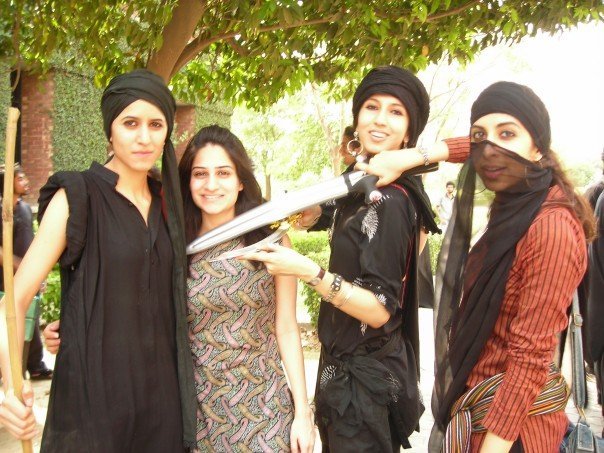
A few weeks ago, I celebrated my 30th birthday. And looking back at that smug, overambitious piece of paper (I still have a copy), what do you suppose I felt? Disappointment, at falling short on pretty much all of my grandiose goals? Guilt, for being lazy, for not doing “enough”, for not “living up to my potential”? Anger, at myself, at people around me, at the circumstances that thwarted my legendary ascent to that 8,000-meter peak and to age 30?
No. I only laughed! Frankly, I couldn’t give a baboon’s butt about goals, objectives, achievements that you could enumerate on a CV, that you could neatly check off from a “bucket list” and be done with. I didn’t care about what I may have expected from life 10 years ago, 5 years ago, even 1 year ago.
I used to care, I used to care a lot. During my 20s, I was beleaguered by that pervasive pressure to “achieve”, all too familiar to us Millennials. Often times, we weren’t even sure of what we wanted to achieve; it could be an important position at a multinational corporation or a big bank, it could be starting our own business, running an NGO, getting a PhD, “making a difference”. Yes, what we wanted most of all was to make a difference, to “change the world”.
I am not a superhero!
I stopped thinking like that some time ago, and it was a conscious decision. I stopped thinking that I could change the world.

That’s not to say that I became cynical. I just realized that I, as one individual, did not have the power to change or “save” the world. I couldn’t eradicate poverty. I couldn’t stop wars. I couldn’t ensure that every child on the street went to school, that no woman was raped by any man. I couldn’t put an end to meaningless violence, I couldn’t reverse global warming.
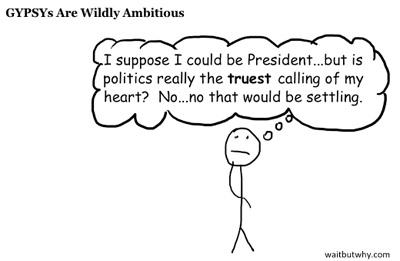 I couldn’t carry through any of this in my own hometown Lahore, let alone the entire world. The world was chockfull of problems, had always been, and would always be. It was the sorry fate of humankind. And to think that you were somehow “special”, that you could clean up a mess that was centuries, millenia in the making just like you’d solve a nifty Math problem, was downright arrogant.
I couldn’t carry through any of this in my own hometown Lahore, let alone the entire world. The world was chockfull of problems, had always been, and would always be. It was the sorry fate of humankind. And to think that you were somehow “special”, that you could clean up a mess that was centuries, millenia in the making just like you’d solve a nifty Math problem, was downright arrogant.
Once in a while, perhaps once in every generation, somebody exceptional came along. Extraordinary people who, by dint of birth, effort, circumstance, and some serendipitous conjunction of the stars, did extraordinary things. The world’s heroes and heroines, revolutionaries and prophets, thinkers and humanitarians, inventors and scientists, artists and writers, whose names we all read in history books. I don’t suppose that any of these great people ever planned on changing the world, or becoming famous. I don’t suppose they wrote about it in their college applications, or scribbled it on their “bucket lists”.
I think they were just going about their lives, one day at a time, doing whatever it was they loved and believed in – not expecting any accolades or honors, not preoccupying themselves too much with “results”, just following their intuition, being themselves.
That’s one thing we all have the power to do; be ourselves. Improve ourselves, and consequently, have a positive effect on everything around us.
It could be something as simple as, say, recycling your trash. Giving a sandwich to the homeless man on your street. Holding open the door for an old lady at the metro station. Lending an ear to a friend who’s had a bad day. Giving somebody an unexpected gift. Teaching somebody a skill, or learning something new yourself. Making friends with somebody from a different religion, ethnicity, culture and country. Making the world a more tolerant, a more peaceful, kinder and happier place by embodying those qualities in your own person.
That was, realistically, the best I could do, and it was enough for me. There was no point in beating yourself up over “failed” ambitions or irrational expectations, neither your own nor those of others.

I am not a martyr or a saint!
The expectations of others, or “What will people think!”. We’ve all been oppressed by them – from something as trivial as buying the “right” gift for a birthday party, “having” to attend a cousin’s friend’s brother’s wedding or wearing the “right” outfit to a family lunch, to being emotionally coerced into a marriage by your parents, putting up with an abusive husband, sticking with a job that daily sucks the life out of you. Why? Because that’s what you’re expected to do. That’s what a good, responsible, respectable man or woman does. A good, responsible, respectable person makes everybody happy – everybody except himself. A good person is a martyr.
Now, there may be people out there who would gladly suffer all these societal tortures, and many more, out of a genuine sense of duty, or out of pure selflessness. But most of us are not like that. We are not selfless. We are not saints. We may like to think we are, but deep down inside, where nobody can hear our true thoughts, we ask ourselves: “Why am I doing this? Is it worth it? I’m fulfilling all my ‘duties’, but why am I still so miserable?”
There’s something perversely romantic about misery, the notion of sacrificing your life for the sake of others, for your children, parents, friends, your community and country, without a thought to your own wishes and desires. Whether or not you enjoy being cast in that role, society will definitely love you for it.
On the other hand, society will not take kindly to seeing you happy. That’s just shameless. And, if you insist on being so brazenly optimistic, then at least pretend to have something to gripe about!

This kind of thinking is typical among desis (South Asians), and I was done with it. If your actions didn’t spring from love or genuine kindness, if your only motivation was to “live up to” some vague ideal or ill-conceived expectation, the fear of what people might say, then those actions were worth very little. It was better to spare yourself and the people around you the charade. The fact was, you couldn’t make anybody happy, truly happy – not your parents, not your partner, not your kids nor colleagues, nor posterity – unless you were happy and fulfilled yourself. It was not always the simpler choice; oftentimes, it was easier to be miserable, it was easier to be a doormat than to stand up for your inviolable right to happiness. But it was a choice you made.

I am not a victim
So far, I’ve led a pretty privileged life. I’ve never known hunger, or homelessness, or direct violence or abuse, none of the unimaginable hardships that form reality for millions of people around the world. All of us, sitting at our laptops or scrolling down our smart phones, are familiar with the ordinary struggles of human existence – death and sickness in the family, relationship troubles, financial crises – but nothing as shattering as the experience of a child in a war-torn country, a family who has lost everything in a natural disaster, the victim of racism or religious persecution, a refugee, an addict, a prisoner, a slave.
Given the enormous advantages that we already have, there is really no excuse for us to feel sorry for ourselves, or vainly blame others for our own unhappiness. We are not victims, and we are certainly not helpless. We are lucky enough to be able to choose what we want to do, how we want to live. We are lucky enough to be able to make our own decisions, chart our own priorities, control the course of our lives with some degree of certainty (putting aside a percentage for qismat, of course). It could be, for example, choosing to spend on a holiday rather than a new piece of jewelry, or exercising instead of watching TV. Or it could be something more far-reaching, like deciding to move to a new country, taking on a new job, having a baby.
The bottom line is, we all are blessed. We all have gifts, we all have dreams, and most importantly, we all have volition. We just need to muster up the courage to pull those tricks out from our magic bags and put them to use, in spite ourselves.
I am rather insignificant
So, what have I learnt about life after 30 years? It doesn’t seem like a whole lot, even by earthly accounts. In the universal scheme of things, it’s embarrassingly negligible…

But, keeping things relative, as of now I feel that life is really about living. It’s not about achieving lofty goals, building lofty monuments, racking up positions, bank accounts, cars and TVs and diamonds. It’s not about pleasing others, being a hero, a saint or a superstar, devoting your life to any one cause.
It’s about finding contentment, finding beauty, finding peace in the little things. The day-to-day achievements, the seemingly mundane. You learnt a new word today. You tried a new dish. You finished an assignment before deadline. You took your kids to the movies. You caught up with an old friend. You explored a new neighborhood. You danced under the trees.
Your expectations of yourself need not be grander. Yes, you may wish to write a book one day, or set up a charity school – I know I do! I haven’t forgotten those dreams. But I’m no longer in a rush to accomplish them, nor am I going to let them dictate or frustrate my present.
I look…different!
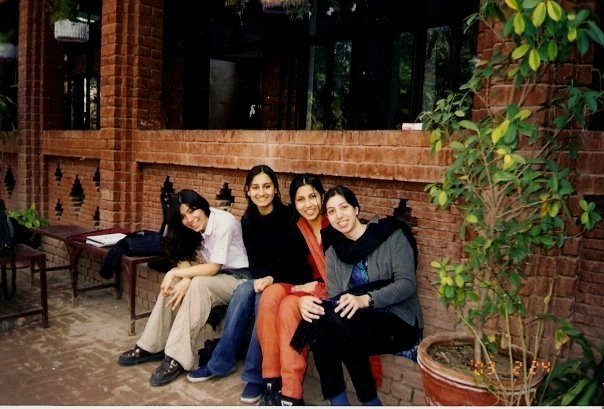
There was a time when I’d walk out of the house with a squeaky clean face and just a dash of kajal in the eyes, ready to go to college, a dinner or a wedding; now, I use makeup on a regular basis. I even wear lipstick, something I found utterly loathsome at 20! The salon girl makes it a point to count out the growing number of white hairs on my head every time I go for a trim, shaking her head disapprovingly, “But why don’t you dye???” I find myself flipping magazines at various doctors’ clinics much more often, thanks to an array of itinerant physical pains. I’ve become more attentive to what I eat, trying my best to choose a salad or a piece of fruit over a cupcake or a toast slathered with butter and marmalade; before, I couldn’t be bothered about the lumps of sodium in ChinChin Chinaman’s hot and sour soup, or the pools of grease in the LUMS cafeteria chicken karhai.

Then there are the inner changes, the ones you can’t really see; I feel happy, but in a calmer way. I’m not in a hurry to go anywhere, do anything, be anyone. I don’t care as much of what people think of me, and I’m a lot less concerned about offending somebody over a nicety. The smudges of shyness and self-consciousness that I had retained from teenage into my 20s have all but dissipated – and life is so much easier without them! I avoid comparing myself with others, I try not to be overly self-critical (a family trait), and most of all, I remind myself to be grateful, and not take life too seriously.
And what of the idealistic goals of that fictional 10-year old CV? Well, I didn’t fall off the mark entirely when I made those predictions. So I’m not a correspondent with Al Jazeera TV, but I did work at Democracy Now, the most excellent independent TV news program in the U.S. (in my opinion!). I’m not a certified yoga instructor, but I am an uncertified Bollywood dance teacher! There’s no collection of short stories (let alone award-winning), but there is an in-progress research project and an intermittent blog. I’m not the director of any charity, but I basically do volunteer work for a living, from museums to bookstores to archaeology pits. I’d say I’ve got 2 languages down in the farr farr category, with a 3rd one in the works; and, instead of summiting the base camp of an 8,000 meter peak, I chose to throw myself out of a perfectly good airplane 1,000 meters in the sky (you do some ridiculous things in your 20s). So, all in all, I’m pretty satisfied with the 30-year report card!
As should you be with yours! There’s no need to feel despondent and have regrets about what you could have done and didn’t do; and there’s no need to panic that your “best years” are flying by so you better make “the most” of them. With good health and a little bit of qismat, every year, every day can be your best, if decide to make it so.
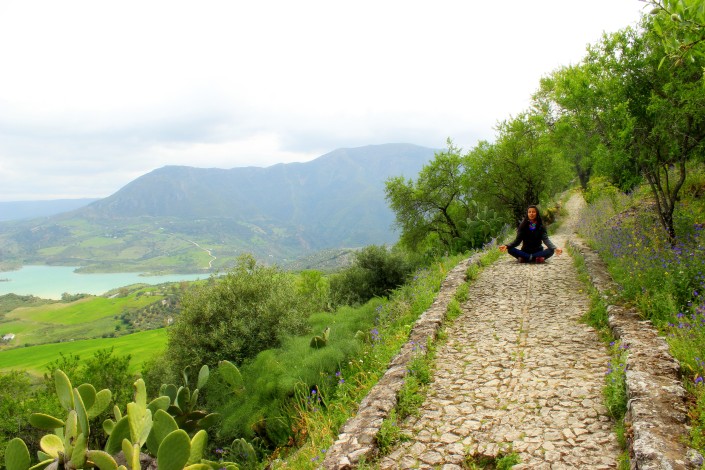
The Legend of Saif-ul-Malook Part VI
Lake Saif-ul-Malook, situated at a height 10, 600 feet at the northern tip of the Kaghan Valley in Pakistan’s Himalayas, is one of the most beautiful places on earth. I have been there twice, the first time as a 12-year old and then in 2009, when I determined to capture some of its magic on camera and on paper, in the words of two local storytellers who relate the legend of the Lake to visitors.
It is the story of a prince and a fairy, Saif-ul-Malook and Badr-ul-Jamal – a story of love, adventure, faith, magic, suffering and betrayal – a story of the multitude of human passions.
Many different versions exist, but below is a reproduction of what the storytellers told us, with ample writer’s liberties. I hope you enjoy it!
Read Part I, Part II, Part III, Part IV & Part V of the story
Now, you may wonder, what was Prince Saif up to at the moment Badr Jamal made her escape from the Palace in the shape of a white dove?
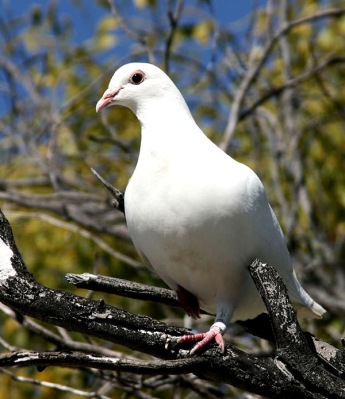
In fact, he was resting beneath the shade of an ebony tree deep in the woodlands of Nubia, after a fruitful but exhausting deer hunt. Eyes half-closed, stretched out on the soft green grass, he was thinking sweet thoughts about his beloved Fairy Queen, when a little white dove came and alighted on a branch above him.
It seemed to Saif that she was the prettiest dove he had ever seen – even though he didn’t consider himself a “bird person” – and he was suddenly possessed by a desire to capture her. “She’d make a nice little pet for my beautiful Badr,” he mused. So, he quietly got to his feet, picked up a net that lay amongst his hunting paraphernalia, and flung it over the bird.
But the net, as if repelled by an invisible force, bounced straight back at him, while the dove sat merrily on her perch untouched. Saif tried a second time to ensnare the bird, then a third, with the same perplexing result.
Then – and Saif could hardly believe his eyes or his ears, though he had witnessed his fair share of fantastic events – the dove turned her soft white head towards the Prince and spoke to him, in voice he could recognize among millions:
“Your attempts to capture me are in vain, Prince Saif. You can never own me. You can never possess me.”
It was Badr Jamal, of course.
“The only way to convince me of your love,” the bird continued, “the only way you will truly earn my love, is if you follow me to Paristan, my homeland. If you succeed in this, if you are able to brave the journey and seek me out in my father’s palace, among my own kind, I promise I will come back with you, as your wife and partner in life. And I will never leave your side till as long as you live.”
With these words, Badr Jamal fluttered her snowy white wings and was off, leaving Saif in a state of utter discombobulation.
On his return to Egypt, one look at his mother’s swollen red eyes and the funereal aspect of the Palace confirmed Saif’s worst suspicions – Badr Jamal, his beloved, the person he cherished more than anything else in the world, the person whom he had struggled to attain for six long, arduous years, was gone.
Saif didn’t want to hear anything. What had happened during his brief absence from the Palace? Why? How? All that was irrelevant now. He knew what he had to do.
“Mother, please tell one of the servants to saddle up a good, strong horse and prepare me a travel bag, with enough provisions to last about a month. I’m leaving right away.”
“But, Saif!” his mother pleaded. “Don’t you see? Badr Jamal doesn’t want to be here! Let her go, Saif. She is happier with her own kind. Please, just forget about her! There is no dearth of beautiful ladies here in Egypt. Think, Saif, destiny has afforded you a second chance at a happy, normal life. Don’t gamble it away for an illusion, for a fantasy, my son! Don’t let this madness get the better of you!”
However, as before, the Queen Mother’s weeping, wailing and emotional threats had no effect on Prince Saif’s resolve. He was an obstinate fellow, and he truly did love Badr. Just as he had found his way to the magical lake in Kaghan Valley, just as he had completed the 40-day penance, the chilla, and escaped from the Ogre and the Flood with Badr in his arms, so he would bring her back from the deepest, darkest dungeons of Paristan if he had to.
“I’m sorry, Mother,” he embraced the Queen one final time before mounting his ride. “But I can’t give up without even trying.” Kicking the horse into a gallop, Saif rode away from the Palace a second time, without looking back.

Now, Prince Saif didn’t really know where Paristan was, or whether it even existed. Legends placed the kingdom of the fairies “east of Egypt”, somewhere on the mountainous border of Persia and India – and the directions stopped there.
So, he travelled east for several months, crossing Sinai, the fabled rivers Tigris and Euphrates of Mesopotamia, the Great Salt Desert of Persia, the Snowy Mountains of Afghanistan, stopping time to time at some shepherd’s hut or sarai, a highway inn, to rest and refresh his supplies.
Many times he cursed himself for forgetting to carry his Sulemani topi, the magic cap bequeathed to him by the old buzurg during his first quest, which had the power to transport its wearer to any place on earth in the twinkling of an eye.
“I suppose I’m not allowed any shortcuts this time,” he grumbled.
At length, Saif reached Peshawar, or Purushapura, as it was known then, the bustling western capital of the Kushan Empire, gateway to the Indian subcontinent. Merchants from all corners of the Silk Route thronged its narrow streets, hawking their varied wares in loud voices – silk, cashmere, cotton, spices, dry fruit, wine, carpets, woodwork, decorative objects of marble, ivory and jade, gemstones, weapons, secrets and stories – there was nothing you could not find in the legendary markets of Purushapura.
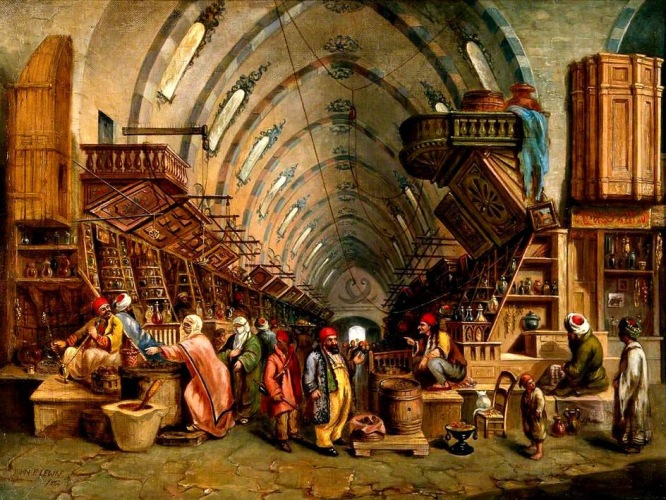
Meandering through the bazaar while his horse rested in the city’s stables, Prince Saif stopped at a chai khana, a tea shop, for a cup of the traditional Peshawari kahwa, hot green tea sweetened with honey or sugar and spiced with cardamom. Looking around the crowded little shop for a place to sit, he spotted an empty stool next to an old man with a flowing white beard, who sat calmly sipping his tea and fingering a rosary.
Prince Saif walked up to the old man, saluted him with a respectful bow, and said, “Venerable sir, would you be so kind as to allow this weary traveller to seat himself beside you?”
The old man looked up at Saif. Their eyes met, and Saif had the sensation that he knew him from somewhere; that this was not a chance encounter. “My son!” the old man smiled, eyes crinkling at the corners. “Please, it would be my honor.

“And now, tell me,” he continued, once Saif had made himself comfortable and given his order. “What brings a gentleman like yourself to this wily merchant’s city?”
Quickly, Prince Saif related to his new friend the objective of his journey: to reach the mythical land of Paristan (which, according to legend, lay somewhere in these parts), and recover his beloved Fairy Queen and true wife, Badr Jamal.
“Paristan? My dear lad!”, the old man let out a bemused chortle. “You know the reason why they call it a ‘mythical’ land? Because Paristan has no physical existence! You will not find it on any map, you will not see any signboards pointing out the way, no gates or city walls to saunter through. On the whole, it is entirely impossible for you to reach there in your present state.”
Seeing Prince Saif’s face fall in despair at this rude reality check, the old man hurried to add. “Oh, but don’t look so glum! The good news is that I can help you. Or, at least I have some things that could help you…” He started rummaging through the coarse jute sack he carried, and duly produced a tattered woolen cloak, and a short wooden staff. Saif was overcome by déjà vu.
“I’m sorry, sir,” he interrupted. “But I feel like we’ve met before. Were you ever in Egypt some years back?”
“Nonsense, son! I’ve never set foot outside the city of Peshawar,” the old man hastily brushed aside the question. “Now, listen to me carefully – for although I have not travelled much, I have learnt a great deal in the long journey of my life, from observing and talking to all the people that pass through this city. And what I tell you now may well be the only hope you have of penetrating Paristan and seeing your wife again…”
It was true. Once more, a nameless old buzurg was to be Prince Saif’s savior.
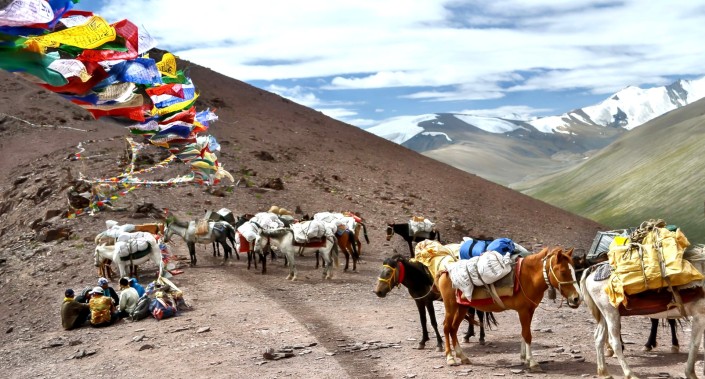
A few hours later, Prince Saif found himself riding with a caravan of merchants towards Tattoo, a small village in the kingdom of Gilgit, perched on the craggy slopes of the magnificent Karakoram mountains. The merchants, heading for China via the Khunjerab Pass, had agreed to drop Saif off at the village in exchange for his horse, a handsome Arabian steed that would fetch a weighty price in the horse fairs of the Mongolian steppe.
Saif parted with the animal with a heavy heart, but he actually had no further use for it. His real destination was 13 miles further off Tattoo, where no horse or mule tracks led; a place called Joot, today famous by its English appellation, Fairy Meadows.
“I have never been to Joot, but I hear tell that it is a most breathtaking place,” the old man at the tea shop had recounted. “They say that a Fairy King of great power established his kingdom there, some 1,000 years ago, in the shadow of that fearsome peak Nanga Parbat, the Naked Mountain.
“Nobody lives in Joot. The locals are wary of venturing there at all because of all the stories; shepherds who went to graze their flocks and never returned; explorers, bandits, naturalists and mystics, attracted to the place by its beauty and its solitude, and never seen again. It is enchanted, they say, the abode of witches and jinns, as perilous as it is beautiful.
“This is where you must go.”
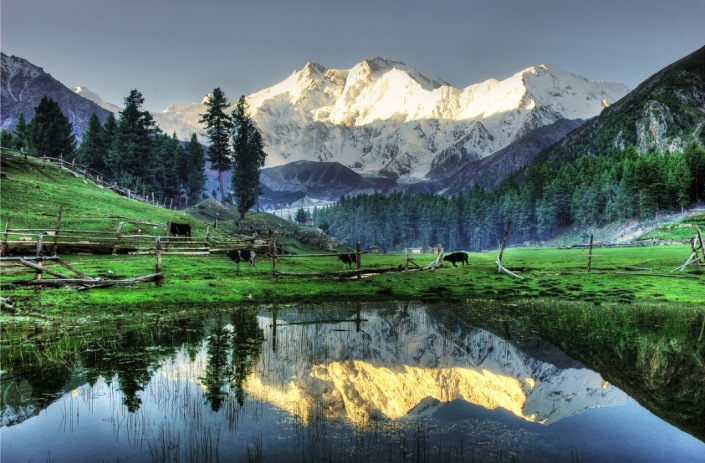
And that is where Saif had arrived, after a grueling uphill hike from Tattoo, following the old man’s directions to the letter. He stood in the middle of a vast green meadow, facing the awesome, ice-covered Nanga Parbat. Dusk was approaching, and there was not a soul in sight. All was silent, except for the gentle hum of the evening breeze amongst the pines.
Saif pulled out from his satchel the tattered woolen cloak. “Once you don this cloak,” the old man had explained, “everything around you that is made from the hands of men, will dissolve from view. Buildings, roads, entire cities, will simply vanish.
“And everything that was hitherto unseen – the realm of jinns and fairies, and all other manner of supernatural creatures – will suddenly come to light, as real, as tangible, as indubitable as that tea cup you hold in your hands.”
As for the wooden staff, the old man had said he had bought it from a wandering Jewish mendicant, who claimed that the staff contained a tiny fragment of the miraculous staff of Moses. Placed in the right hands, it had the power to unlock or open any kind of barrier – gates, doors, chains – both magical and mundane.
Standing before that gigantic mountain in the grassy fields of Joot, the very location of Paristan, all that was left for Saif to do was throw on the cloak, brandish the staff, and smash his way into the Fairy King’s palace to recover his bride.
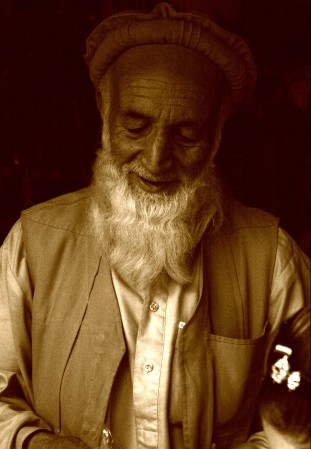
But Saif hesitated. What if all of this was a lie? What if the old man had tricked him? And now, there he was, alone in that desolate spot with no food, no shelter, no money, not even his horse to help him retrace his steps and make the long journey home…
By this time it was almost completely dark, and a silver slipper of a moon had begun to glimmer above the jagged peaks of the Karakoram.
“Well, I don’t really have another plan, so I might as well give this a shot,” Saif thought. So, taking a deep breath, he grasped the wooden staff and wrapped the woolen cloak tightly around him….
The things that happened henceforth are better left imagined. For sometimes there are sights so wondrous, events so singular that they defy description.
Let’s just say that the old man in the tea shop had known what he was talking about!
Read Part VII, the final instalment of the story
Madrid Diaries: Unemployed but Happy
“I’ve learned that making a ‘living’ is not the same thing as making a ‘life.’” ~ Maya Angelou
Whenever I meet somebody new and they find out, during the course of the conversation, that I’ve been jobless for over one year, living in a foreign country where I have no family or prior acquaintances, and where I just barely speak the language, they look at me incredulously, stupefied: “But what do you do all day? How do you survive? Aren’t you bored to death?”
Let me just mention here that my lack of gainful employment has little to do with laziness, unwillingness, or the “handsome fortune” I may possess, and mostly to do with my legal status in Spain (residencia sin trabajo – residency without work), coupled with the language barrier (dam, rather) that I’m still slowly chipping away at.
But I find it odd, the amount of importance people attach to what you “do” for a living. I myself used to be one of those people: ever since college, I had never been without a job of some sort, full-time, part-time, internship, fellowship, what have you. Even though I wasn’t particularly ambitious or “career-driven”, I took pride in the work I did, because I saw it as a “productive” use of my time, as a contribution towards my own financial wellbeing, and as a logical step forward in my profession, another glittering addition to my resume. And, even if none of that held true, at least I would have a response to that piquing, unrelenting question, the backbone of social banter – “So, what do you do?” I could define myself in one neat, clean, impressive title, and immediately win the other person’s respect. That felt good.
So what happened when I followed my Erasmus Mundus PhD candidate-better half to Spain? What happened when the prospect of landing a job of any kind – let alone related to my career – was suddenly as bright as a Lahori home on a sticky summer’s night? (non-Lahoris/Pakistanis, look up “load shedding” on Wikipedia!)
Well, like any respectably assiduous person, I was frustrated; frustrated with my lack of “productiveness”, uncomfortable with my own free time, guilty of spending money when I wasn’t earning any, guilty of letting my Berkeley Master’s degree “go to waste”; apologetic of my “situation” in general, sighing deeply and resignedly whenever the topic came up…
But the truth is – I wasn’t unhappy. Six months down the line, I was pretty darn happy, and far, far from bored. Society tends to evaluate people based on degrees, paychecks, publications, trophies, on solid, tangible proofs of “success” and one-word descriptions of what they “do for a living”. “I’m a doctor – actor – teacher – writer – cleaner – waiter …” As if nothing exists beyond the ambit of those rectangular brackets.
But we are so, so much more than what we do. The tragic part is that most people never have the time, the opportunity or the motivation to explore themselves beyond the one-word labels, to spill out over the edges of their rectangular holes. I figured: I’m here in this fantastic European city, lucky enough to have time, opportunity and buckets of motivation – could I really complain about my “situation”?
Now, when someone asks me the invariable, the pedestrian, “So, what do you do?”, I cheerfully reply, “Well, I’m currently employed with living”, and present to them the following list:
1. Dance
Apart from taking regular classes at the Karnak School of Oriental Dance in Madrid, I started teaching Bollywood Dance earlier this year with Tara, my partner-in-crime from across the Wagah border. Our group, Mantara, recently performed at a Diwali Dance Fiesta, where our lovely alumnas did splendidly well. Throw in Indo-Pak feasts at the local (Bangladeshi) restaurants and mini-dholkis at my house, complete with mehndi (henna), chai, retro Bollywood music videos and Coke Studio Pakistan, and home doesn’t feel so far away!
2. Song
I also recently joined Voces de Ida y Vuelta, a multicultural, multlingual choir that performs at local fundraisers and charity events. Grouped with the sopranos, I’m currently working on reaching glass-shattering pitches and memorizing Cuban, Chilean, Brazilian and Gabonese songs, with many more canciones to come – including one from Pakistan!
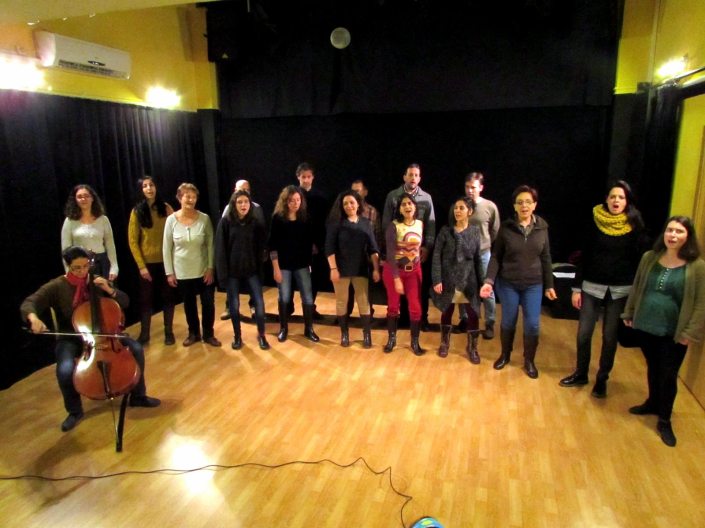
3. Art
I don’t “make” art (unless you count photography), but Madrid is such a fantastic place to see and appreciate all kinds of art – for free! – that you can’t help soaking it up every day, as you casually stroll through an exhibition at the neighbourhood gallery or at a random cafe, at the former Post Office, the one-time slaughterhouse or tobacco factory, at Retiro Park, or in the graffitied alleys of Malasaña. Over the course of my artistic education in Madrid, I’ve decided that I don’t particularly like (or understand) Picasso, but Dali I find fascinating (though I don’t fully understand him either). I’ve also decided that if a painting looks too much like a photograph, then it isn’t a good painting. There, my two cents of artistic wisdom!
4. Archaeology
Following up on an old dream (not inspired by Indiana Jones!), I volunteered for an archaeological excavation (read: labour camp) this summer, in the small town of Pollena Trocchia in the south of Italy. Together with 20 bright-faced archaeology undergrads from the U.S., U.K., Canada and Europe (I had to represent the brown people of the world), I dug, scraped, shoveled, pick-axed, sifted, wheelbarrowed and rolled around in incalculable amounts of volcanic soil at the site of an ancient Roman Bathhouse and Villa, destroyed in 472 C.E. by the eruption of Mount Vesuvius. Needless to say, working as a mazdoor under the hot Neapolitan sun and living like a mazdoor (10 perpetually filthy people sharing a perpetually filthy dorm and bathroom) gave me a whole new appreciation of the academic world, of airconditioned libraries and sparkly-floored museums, not to mention of my own sparkling bedroom and bathroom. But, inspite of it being one of the most physically challenging things I have done in my life, I’m not “cured” of my archaeology illusions quite yet!
5. Food
I’ve always been fond of tinkering around in the kitchen, and every new place inspires you to add new dishes to your repertoire. So, apart from the classic spaghetti bolognese (Pakistani style), the best Thai Green Curry you’ll ever have this side of the Pacific, and my special death-by-chocolate brownies, here are some other hearty goodies you’ll get to sample at Casa Manal. (Note: These photos are not my own, but I swear, the food looks just like this!)
6. Park
If there’s one place we’ve spent more time in Madrid than any other, it’s Retiro Park. Madrid’s main park used to be a retiro, a retreat for Spanish royals until the late 19th century, when it was opened to the public. It’s big, it’s beautiful, and you can do absolutely anything you want there, from running, biking, rollerblading, boating and gyming to yoga, tai chee, frisbee, slacklining, dancing (thanks to us!), to watching magic shows, puppets and live music, seeing art exhibitions, enjoying a coffee, lemonade or sangria (whichever you prefer), to dozing quietly in a shady corner – a little piece of paradise in the heart of Madrid.
7. Language
Apart from continuing Spanish classes at C.E.E. Idiomas and regular intercambio coffee dates with my Spanish girl friends, I’ve added a new item to the daily study regimen – Spanish TV soaps. I’ve never been much of a TV buff, but there’s a certain pleasure in ensconcing yourself on a sofa with a blanket and a box of cookies and watching a dramatic story of some other place and time unfold magically infront of your eyes on an HD TV screen. And here in Madrid, I have an excuse to watch all the TV I want! From the weighty life of Spanish “Reconquista” Queen Isabel to swashbuckling adventures in the Spanish American colonies to a feudal family drama set in a Franco-era Castillian village, I’ll be speaking the Queen’s (500 year-old diction of) Spanish in no time!
8. Volunteering
I joined the WWF (World Wildlife Fund) Madrid Volunteer Network shortly after arriving in the city, but was initally too scared to go to their weekly and monthly activities (tree plantings, bird censuses, plodding around marshes and other strange things that only me and my partner-in-crime from across the border would find enjoyable). We did make it to the Earth Hour event though, inspite of the pouring rain, proving our mettle as die-hard WWF supporters and being rewarded with Panda T-shirts. I plan to join the regular field activites as soon as the weather warms up, this time with reinforced Spanish!
9. Travel & Photography
Perhaps the best part about living in Europe is the travelling – within a few hours flight from Madrid I can be in any number of different European capitals, each with a different language, different architecture, food and feel. And if you plan in advance and are a savvy deal-hunter like I’ve become, the trip won’t cost you a euro more than it would have in your shoestring student-budget days.
But there’s so much to see in Spain itself that we haven’t yet been tempted by elaborate holidays abroad. I watch with satisfaction as the souvenir magnet collection on our fridge steadily grows, as do the number of photo archives on my computer. For me, travelling is pure thrill – every time I go to a bus terminal, a train station or an airport, I feel slightly giddy, as if I were 8 years old and about to step into Disneyland. Each time I’m wandering the streets of a new city, curiosity and a camera in hand, I feel that strange sense of belonging everywhere, yet of belonging nowhere.
And each time I travel, I’m reminded about how beautiful the world is, how diverse the world is, and how similar we all are – all of us humans, busily making lives and earning livings in whatever little patch of earth we call home. In the end, no matter what we do or don’t do, happiness doesn’t come to us. It flows from within.
How to Make Friends in a New City – Tip #4
- LANGUAGE EXCHANGE
Language exchange, or intercambio, is a popular (and free) method of learning languages in Spain. There was a plethora, a veritable sea of Spaniards out there, my Spanish teacher told me, who were desperate to find a sympathetic English-speaker to practice their hesitant conversational skills with. English is taught in Spanish schools as an optional second language, but in the most pedantic way possible, so that somebody who has “studied” English for over 10 years can barely formulate a coherent reply to a “Hi, what’s up?”
Kind of like how we were taught Pakistan History in secondary school. Once, in a surprise test, the teacher asked us to write an essay comparing the achievements and successes of two of Pakistan’s Prime Ministers. I started with the conventional introduction (memorized from the textbook, of course), ended with the conventional conclusion (we knew it like we knew our multiplication tables), and filled in the middle with a fictitious story, sprinkled with song lyrics. The result? 9/10, if you please, and a “Well Done!”
But, coming back to Spain – intercambio sounded like the perfect arrangement for me. Not only would it help my Spanish, I would also have somebody to chat with over a cup of coffee – that nameless, shadowy, friend-like figure I wanted so badly in Madrid! All I had to do was find somebody…
I immediately set to work. I went to tusclasesparticulares.com, created a profile, and posted an anuncio, an ad, stating my particulars in a cheerful, casual tone, and offering my stupendous English-speaking ability in exchange for un poco ayuda with my abysmal Spanish. We could meet in a cafe, or a park, como tu prefieres. I enjoyed photography, and writing, and meeting new people. Hoped to hear from you soon!
It almost felt like online dating, or shaadi.com. I went to bed that night with a flutter of excitement in my heart. Who would read my ad? Who would reply? Would I like them?
But nothing could have prepared me for the deluge of emails I found in my inbox the next morning; messages from men and women of all ages, all walks of life, from the city of Madrid and beyond, asking for my hand as their intercambio partner.
I was terribly flattered – and a bit overwhelmed. There were just too many fish in the sea. I needed to focus, start being selective, separate the wheat from the chaff, as they say. So began Step 2 of the intercambio-partner-hunt: carefully reading every ‘applicant’s’ email to divine something about their personality (Does she sound too serious? Does he sound sleazy?), stalking them on Facebook and Twitter, examining any photos that turned up. Some applications were discarded immediately; for example, the 38 year-old pianist who sent me a tea-stained studio portrait of himself in a brown fedora and brown tweed suit, or the 18-year old Economics student whose entire album of Facebook profile pictures consisted of duck-faced selfies.
After I had completed the first shortlist, I sent an email to each selected ‘applicant’, requesting, somewhat discreetly, a 200-word personal statement: “So, what do you do? What have you studied? What are your hobbies? I think it’s important, for a successful intercambio, that we share some interests, don’t you agree?”
When the replies started coming in, I made a second shortlist. Emails that included the words “books”, “languages”, “cinema”, “outdoors”, “museums” and “dogs”, for instance, were directed to the “Yes” Folder, while emails with the words “motorbikes”, “shopping”, “clubbing” and “pop music” were immediately relegated to the “Rejects” Folder (no offense meant to motorbike aficionados, shopaholics and Katy Perry fans, it’s just that, I wouldn’t know what to say to you!).
Now came the hard part: the actual, face-to-face meeting! I made appointments with the final 10 candidates, to meet them at a public square or coffee shop – blind dates, really. We barely had any idea of what the other person even looked like. And anyone who has been on a blind date will know that the first meeting was absolutely crucial. It could make or break the budding relationship. Either you liked the person, or you didn’t. Either you wanted to see that person again, or you didn’t.
Sure, I had my share of disappointing dates. Some people, intimidatingly interesting on paper, were plain boring in real life. Some people lacked energy or enthusiasm (for which I always tended to overcompensate, resulting in the peculiar condition know as the “laughing headache”), and some people just didn’t speak. In these cases, I found silence to be the best way to politely “end” things. In other cases, I was forced to lie: “I’m sorry, I’ve found a job as a dogwalker and don’t have time to do intercambio anymore!”
But, with some people, it just clicked. Conversation flowed naturally, there was laughter on both sides, and you were perfectly at ease after the first five minutes. I met a medley of memorable characters – a lawyer, a psychologist, a biochemist, an astrophysicist – all more or less my age, warm, openminded, hardworking people from different parts of Spain, who somehow found time to meet me for intercambio in their 10-hour work days. Finally, I could stop! Stop the endless virtual interviews, the awkward blind dates, the cruel but inevitable rejections!
So, has language exchange made me fluent in Spanish? No. Has my Spanish improved? I’d like to think so, yes. But more importantly, I’ve found Spanish friends, and through them, an insight into Spain. They tell me their views on love, marriage, family, religion, politics, and I share with them my experiences growing up in Pakistan and living in the United States, two completely different worlds about which they are equally curious. It’s strange how two people, complete strangers in one moment, can go to speaking about their personal lives with the air of old friends in the next. It is something that happens always with expats – maybe out of the boldness that comes with being a foreigner, or maybe out of our intrinsic need to trust, to talk, to confide in a palpable human being, in a place where there are no givens, where we must build our life up from the ground.
Read Tip #1,Tip #2, Tip #3, Tip #5, and the introductory post of this series!






